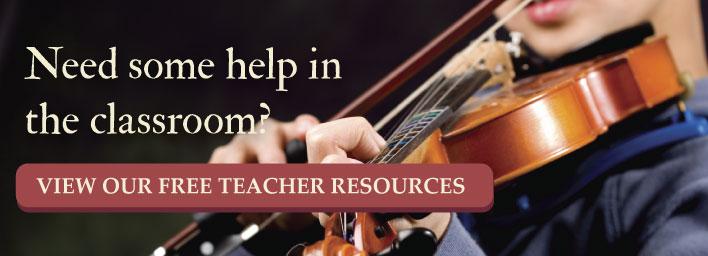How To Motivate Your Students After Winter Break

Educators know that after a long winter break, building enthusiasm can be a struggle. You need to find ways to motivate your music students, because introducing the same-old can zone them out. Fortunately, there have been a number of studies conducted concerning music student motivation techniques. Since the research is based on real test subjects, you can be assured that introducing these concepts into your learning environment will have a positive influence on your students’ drive and determination.
The following information is based on a research article written by Brett Jones for the International Journal of Teaching and Learning in Higher Education, and examines motivation related to academic achievement. However, the principles outlined also pertain to music training because they apply to the same social-cognitive responses present in any learning atmosphere. By incorporating these concepts into your lesson plans, you’ll give your students the motivation they need to shake off any lingering lethargy left-over from winter break.
Empowerment
The first thing required for music student motivation is empowerment. This is the amount of “perceived control” students feel like they have over what they are learning. The main thing to remember is that your students must “believe” that they have a portion of control over some part of their education. Suggestions include:
- Allowing students to choose some types of music to study.
- Asking for student input concerning class activities.
- Instituting group discussions or a suggestion box that gives students the opportunity to influence classroom policy; and then actually implementing some of the good ideas.
Empowering your students means listening to their needs and responding so that they see that their ideas have an impact on their education.
Usefulness
In a music class, the usefulness of learning the techniques is pretty obvious. However, you can enhance this concept by periodically adding “real-world” examples of how their music training can influence their success. For example, you can arrange to have sound engineers visit the class, or other music industry professionals. Or, you can arrange for activities that involve real-world skills, like having your students compose a score for a scene of a movie. The idea here is to emphasize how learning music relates to actual jobs in order to motivate your music students.
Success
Design your instruction around a model for student success. This involves striking a balance that challenges your learners, without overwhelming them. Easier said than done, right? When the difficulty level is too low, they feel bored, but when it’s too high, they can feel anxious or discouraged. However, by applying these ideas, you can design a learning system that supports their personal success. Suggestions include:
- Offer challenging concepts, but ensure that each student is able to master it before moving on.
- Divide complex activities into smaller sections.
- Provide regular feedback on the student’s progress. For example, you can create a feedback page for each student, making notes on it throughout the week. Your observations will go a long way toward influencing their motivation.
- Offer alternative methods for demonstrating skills. Not everyone will be able to advance at the same speed. By offering different challenges, students gain the confidence to master other music skills.
Interest
This is another concept that almost goes without saying. Your lessons and class activities must be interesting to maintain music student motivation. Playing the same twinkle variations can become monotonous. Citing a 1992 study by Krapp, Hidi, and Renninger, “interest” is defined as the “liking and willful engagement in a cognitive activity.” For your music students, that means creating lessons and learning projects that absorb their attention. Suggestions include:
- Include games, social interaction, and other hands-on activities.
- Select content that relates to your students’ background and tastes. For example, try including some pop or rock music into your lessons.
- Alternate your presentation style and offer surprising information.
Caring
To properly motivate music students, they must understand that you care about their progress and have a vested stake in their success. Even unconsciously, students will discern whether you are truly interested in their achievements, or if you’re simply going through the motions. Try these ideas:
- Speak to students individually about their progress. You can set up times to have conferences, or you can write personal progress letters to each student.
- Create an atmosphere that welcomes questions and communication. Listening is one of the best ways to show that you care.
- Demonstrate your concern for them by becoming interested in their lives. Try to conduct family sessions, if possible, and pay attention to their non-verbal cues.
These music student motivation techniques can be employed year-round, not just after the winter break, and by creating an environment that constantly motivates students, everyone wins.


